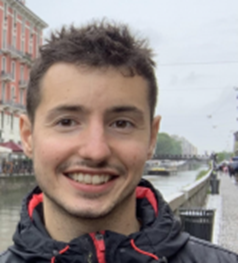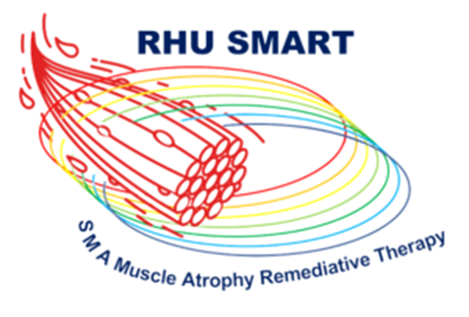MACCHI Robin
|
‣ Licence 1 et 2 entraînement sportif, 2014-2016, Université Jean-Monnet Saint-Etienne. ‣ Bachelor's degree in Engineering and Ergonomics of Physical Activities, 2016-2017, Savoie Mont-Blanc University. ‣ Master's degree in Engineering and Ergonomics of Physical Activities, 2017-2019, Université Savoie Mont-Blanc. ‣ PhD in Human Movement Sciences (2019-2022): Influence of gender on the kinetics of structural and functional recovery after endurance running with gradients, Aix Marseille Université, supervised by Pr. Caroline Nicol and Dr. Fabrice Vercruyssen.
Professional experiences: ‣ Post-Doctorate (2023-2024), SEP-EA 7370, INSEP, Paris (supervisors: Dr. Gaël Guilhem and Dr. Giuseppe Rabita) : Priority research project (FULGUR) - Optimisation of sprint propulsion and prevention of hamstring injuries. ‣ Research engineer internship (2019), Institut Pprime, Poitiers (supervisor: Dr. Mathieu Domalain): Movement analysis of lithic tool production: Impact on the evolution of ancient Hominins. ‣ Biomechanical engineer internship (2018), Salomon SAS, Annecy (supervisor: Dr. Marlène Giandolini): Identification of descriptive biomechanical variables of foot rolling in running and walking conditions. ‣ Research engineer internship (2018), LIBM, Bourget-du-lac (supervisor: Dr. Pierre Samozino): Impact of fatigue on force-speed profile in simulated hypoxic environment. ‣ Tennis instructor (2010-2016), Tennis club Saint-Chamond.
Areas of Expertise : ‣ Neurophysiologiy ‣ Fatigue ‣ Muscle and Motor coordination ‣ Statistics
|
robin.macchi@gmail.com (jean-baptiste.beaume @ univ-smb.fr)
Nationality: French Institution Université Jean Monnet (Saint Etienne) Team: [PAF] Position : PhD student
Publications |
Spinal muscular atrophy (SMA), a rare neuromuscular disease, is characterised by motor neuron degeneration due to the absence of the SMN1 gene and a deficiency in the SMN protein. Clinical manifestations vary widely: some patients with particularly severe forms (types 0 or 1) die before the age of 2 in the absence of treatment, while others maintain independent walking throughout their lives, with no reduction in life expectancy. Recently, three treatments restoring the SMN protein have been approved, improving the life expectancy and quality of life of patients with severe to mild forms of the disease. However, despite these therapeutic advances, fatigability remains a major problem in SMA patients. The variability of clinical manifestations and the complexity of fatigue mechanisms make it difficult to gain a precise understanding of fatigability in this population. Impaired neuromuscular function, resulting from motor neuron degeneration, contributes to fatigue, and muscle atrophy exacerbates weakness, limiting daily activities. The mechanisms of fatigue in SMA patients remain poorly explored, accentuating the need for specific tools to assess fatigability objectively. In this context, we propose to transpose a quadriceps fatigability test (QIF test) that has already been validated in healthy populations. The aim of our project is to adapt it to the motor levels of different SMA patients in order to assess fatigability accurately, taking into account the different phenotypes. The aim is to determine the feasibility, reproducibility and relevance of this test with a view to gaining a better understanding of the aetiology of persistent fatigue in SMA patients. This study could provide the tools needed to assess fatigability objectively, both for regular clinical use and for future clinical trials, underlining the ongoing need for innovative solutions to the persistent challenges associated with fatigability in SMA.
Research Projet: FANTASI-SMART Supervisor: MILLET Guillaume Start: 01/2025 End expected:
| |
1. Macchi R, Kunimasa Y, Chavet P, Corcelle B, Pomportes L, Fazzari C, Hays A, Vercruyssen F, Rossi F, Bendahan D, Nicol C. (2024). Effect of a graded running race on lower limb muscle damage, jump performance and muscle soreness in men and women. Scandinavian in Medicine of sport science. 10.1111/sms.14643 2. Macchi R, Santuz A, Hays A, Vercruyssen F, Arampatzis A, Bar-Hen A, Nicol C. (2022). Sex influence on muscle synergies in a ballistic force-velocity test during the delayed recovery phase after a graded endurance run. Heliyon. https://doi.org/10.1016/j.heliyon.2022.e09573 3. Macchi R, Vercruyssen F, Hays A, Aubert G, Exubis G, Chavet P, Goubert E, Souron R, Yoko K, Nicol C. (2021). Sex influence on the functional recovery pattern after a graded running race: original analysis to identify the recovery profiles. Front Physiol. https://doi.org/10.3389/fphys.2021.649396 4. Besson T, Macchi R, Rossi J, Morio C, Kunimasa Y, Nicol C, Vercruyssen F, Millet GY. (2022). Sex Differences in Endurance Running. Sports Med. https://doi.org/10.1007/s40279-022-01651-w 5. Macchi R, Daver G, Brenet M, Prat S, Hugheville L, Harmand S, Lewis J, et Domalain M. (2021). Biomechanical demands of percussive techniques in the context of early stone toolmaking. Journal of The Royal Society Interface. https://doi.org/10/gmpd7b | |




